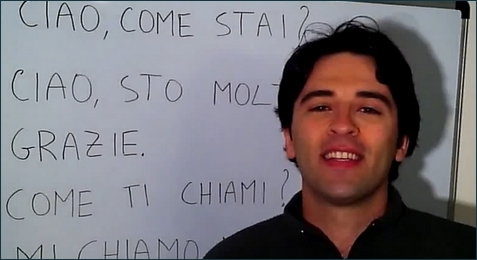If you want to speak Italian properly, you need to know the following grammar rules. In particular you need to know how to conjugate Italian verbs. I’m here to help you in a quick and funny way.
Auxiliary Verbs: Essere and Avere
The Italian language has two auxiliary verbs: the verb “essere”, that means to be, and the verb “avere”, that means to have. These verbs are called auxiliary because they literally help all of the other verbs to build tenses such as the present perfect one.
In Italian the most used tenses are the Presente, the Passato Prossimo (Present Perfect Tense) and the Futuro Semplice (Future Tense). You can now read how auxiliary verbs conjugate in those tenses:
| Presente | Passato Prossimo | Futuro Semplice | ||||
| ESSERE | AVERE | ESSERE | AVERE | ESSERE | AVERE | |
| Io | sono | ho | sono stato | ho avuto | sarò | avrò |
| Tu | sei | hai | sei stato | hai avuto | sarai | avrai |
| Lui/Lei | è | ha | è stato | ha avuto | sarà | avrà |
| Noi | siamo | abbiamo | siamo stati | abbiamo avuto | saremo | avremo |
| Voi | siete | avete | siete stati | avete avuto | sarete | avrete |
| Loro | sono | hanno | sono stati | hanno avuto | saranno | avranno |
Verbs Conjugations: -are, -ere, -ire
It’s important to know that in Italian there are three main different conjugations, depending on their endings in the infinitive: -are, -ere or -ire. For example these three verbs have different conjugations:
-are parlare = to speak
-ere credere = to believe
-ire partire = to leave
It’s important to know each conjugation and its structure in order to conjugate every other regular verb, as the rules are pretty the same for verbs within the same group (-are, -ere o -ire). In fact try to take these infinitive endings off, and add the appropriate subject endings according to the tense, and the pattern becomes clear.
Presente
| 1a Conjugation -are | 2a Conjugation -ere | 3a Conjugation -ire | |||||
| PARLARE | AMARE | LEGGERE | VIVERE | PARTIRE | SENTIRE | CAPIRE | |
| Io | parlo | amo | leggo | vivo | parto | sento | capisco |
| Tu | parli | ami | leggi | vivi | parti | senti | capisci |
| Lui/Lei | parla | ama | legge | vive | parte | sente | capisce |
| Noi | parliamo | amiamo | leggiamo | viviamo | partiamo | sentiamo | capiamo |
| Voi | parlate | amate | leggete | vivete | partite | sentite | capite |
| Loro | parlano | amano | leggono | vivono | partono | sentono | capiscono |
This last verb (capire) is an irregular verb, we will speak later about this kind of verbs.
Passato Prossimo
| 1a Conjugation -are | 2a Conjugation -ere | 3a Conjugation -ire | ||
| PARLARE | LEGGERE | PARTIRE | CAPIRE | |
| Io | ho parlato | ho letto | sono partito | ho capito |
| Tu | hai parlato | hai letto | sei partito | hai capito |
| Lui/Lei | ha parlato | ha letto | è partito | ha capito |
| Noi | abbiamo parlato | abbiamo letto | siamo partiti | abbiamo capito |
| Voi | avete parlato | avete letto | siete partiti | avete capito |
| Loro | hanno parlato | hanno letto | sono partiti | hanno capito |
When to use essere or avere ?
As you surely understood, in same cases we use the auxiliary verb essere (sono partito), while in the majority of cases we use the auxiliary verb avere (ho letto). How do you know if you have to use one or the other ?
While there are not fixed rules, we can say that:
- You should use the auxiliary verb essere with the majority of intransitive verbs and in passive/reflexive phrases.
- You should use the auxiliary verb avere in active phrases when the verb is transitive and with many intransitive verbs.
Instransitive Verbs
In Italian intransitive verbs are for example: “piovere”, “nuotare”, “dormire”, “morire”, “andare”, etc.. and are those verbs which don’t express an action but rather a state or a condition, such as essere (to be), stare (to stay), divenire (to become), etc. Also verbs which express movement: andare (to go), venire (to come), arrivare (to arrive), etc. After these types of verbs we can add information about ‘where’, ‘when’, ‘how’, ‘how long for’, etc. e.g. sto in ufficio tutto il giorno (I’m in the office all day long); Marco va al lavoro in treno (Marco goes to work by train). We can’t however express a direct object. In fact those verbs are meaningful without the need of being followed by a direct object.
Transitive Verbs
Transitive Verbs instead are those verbs who need a direct object in order to better define their meaning (which otherwise would be too wide) . Transitive means ‘to pass’, ‘to cross’, therefore it describes actions that move from the subject directly to an object, without having to use a preposition such as ‘to’, ‘at’, etc. The classic example we learn at school is: io mangio la mela (I eat the apple); in this sentence io is the subject of the verb, mangio is the transitive verb, and la mela is the direct object or accusative. Of course we don’t always express the direct object, for example: la sera mangio presto (in the evening I eat early), the idea of ‘dinner’, ‘meal’, ‘food’ is implicit but not expressed. Similarly, we can say Giovanni guida la macchina per andare a lavorare (Giovanni drives the car to go to work), in which guidare is a transitive verb because it is followed by a direct object, la macchina. However I can omit ‘la macchina’ and simply say Giovanni guida per andare a lavorare, the idea of the car being implicit. For example: comprare, leggere, mangiare, sentire, capire, amare, odiare, vendere, comprare, possedere, vincere… are transitive verbs.
Reflexive Verbs
Reflexive verbs are considered intransitives because the action takes place on the subject itself, therefore the reflexive verb lavarsi (to wash oneself) as in mi lavo le mani (‘I wash my hands’ or more literally ‘I wash myself the hands’) is intransitive, but lavare (to wash) as in io lavo il piatto (I’m washing the plate) is transitive!
Unfortunately dued to the large quantity of verbs and exceptions, I suggest you to learn/memorize each verb and you’ll be sure if you need to use essere or avere.
Futuro Semplice
| 1a Conjugation -are | 2a Conjugation -ere | 3a Conjugation -ire | ||
| PARLARE | LEGGERE | PARTIRE | CAPIRE | |
| Io | parlerò | leggerò | partirò | capirò |
| Tu | parlerai | leggerai | partirai | capirai |
| Lui/Lei | parlerà | leggerà | partirà | capirà |
| Noi | parleremo | leggeremo | partiremo | capiremo |
| Voi | parlerete | leggerete | partirete | capirete |
| Loro | parleranno | leggeranno | partiranno | capiranno |
Regular and Irregular Verbs
In Italian you’ll find regulars and irregular verbs. Regular verbs are easier to learn because when conjugating they follow a regular pattern that can be generalized to all the others regular verbs. Until now, in fact, we have seen only regular verbs (expept for “capire” which is an irregular verb). How do we know if a particular verbs conjugates as a regular or an irregular verb ? Unfortunately there are not fixed rules you can learn on irregulars, you can only learn and memorize those you want to use.
REGULAR VERBS
As said before, the main characteristic of Regular Verbs is that they follow a regular pattern. In fact regular verbs maintain their infinitive root (for example PARL- or CRED-) and they add the appropriate subject endings according to the tense.
| 1a Conjugation -are | 2a Conjugation -ere | 3a Conjugation -ire | |
| PARL-ARE | CRED-ERE | PART-IRE | |
| Io | parl-o | cred-o | part-o |
| Tu | parl-i | cred-i | part-i |
| Lui/Lei | parl-a | cred-e | part-e |
| Noi | parl-iamo | cred-iamo | part-iamo |
| Voi | parl-ate | cred-ete | part-ite |
| Loro | parl-ano | cred-ono | part-ono |
IRREGULAR VERBS
Irregular verbs don’t follow a regular pattern and each verb may present unique irregularities. Some verbs may completely change even their infinitive root when conjugating in other tenses.
Let’s see how some of the most used irregular verbs conjugate:
| ANDARE | STARE | FARE | POTERE | VOLERE | DOVERE | |
| Io | vado | sto | faccio | posso | voglio | devo |
| Tu | vai | stai | fai | puoi | vuoi | devi |
| Lui/Lei | va | sta | fa | può | vuole | deve |
| Noi | andiamo | stiamo | facciamo | possiamo | vogliamo | dobbiamo |
| Voi | andate | state | fate | potete | volete | dovete |
| Loro | vanno | stanno | fanno | possono | vogliono | devono |
I hope you’ve liked this lesson. Please use the comment section below in order to let me know your ideas, your suggestions and invite all of your friends to visit this page and my website.
Un abbraccio, Marco.




Hola marco, muchísimas gracias por la información, estaba creando una tabla de verbos con la conjugación en los tres tiempos en español e italiano y estaba hecho un lio, davvero grazie
Mi sento molto bene con il studio di tu página della internet. Grazie mille. Luisa
hola marco como estas pues me gustaria aprender italiano cuando tengas tiempo escribeme a mi correi grasias
io sono latifa liarun italino
ciao marco timando tantisimo auguri per il tuo studio grazie tamtisimo —-losai guesei un gradepergue ho imparato tamtisimo soloaspeto di poder sgribere meglio…….losai guisei un grade, fuertisimo,fantastico. grasie mille
hola , marcos me encanta tu forma de ayudar a las personas ,gracias por compartir tus conocimientos con los demas . me encantan los idiomas pero no tengo dinero para estudiar. y de esta forma me entretengo.
gracias
braaaaaaaavo marco !! stai facendo un stipendo lavoro
BOA NOITE!
NA QUALIDADE DE INICIANTE, GOSTEI MUITO DO TEU ESTÍLO DE ENSINAR A LÍNGUA ITALIANA.
soy de colombia pero quiero hablar italiano estoy estudiando pero me ayudará mucho su apoyo gracias.
Marco, Soy de Perù, actualmente radico en Torino Italia, mis felicitaciones por la forma tan didàctica de desarrollar los temas, pues me es de mucha ayuda para aprender el idioma Italiano. muy agradecido.